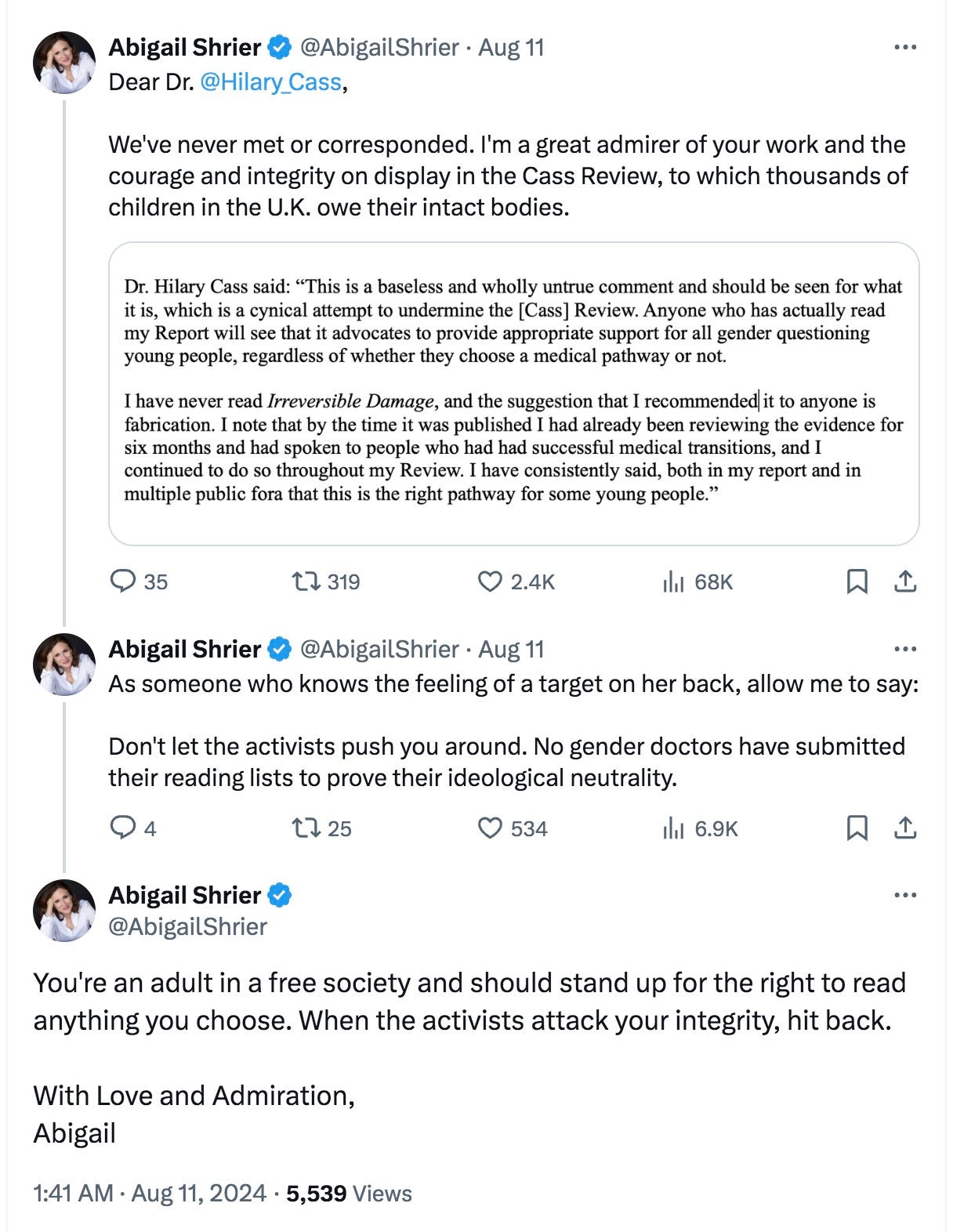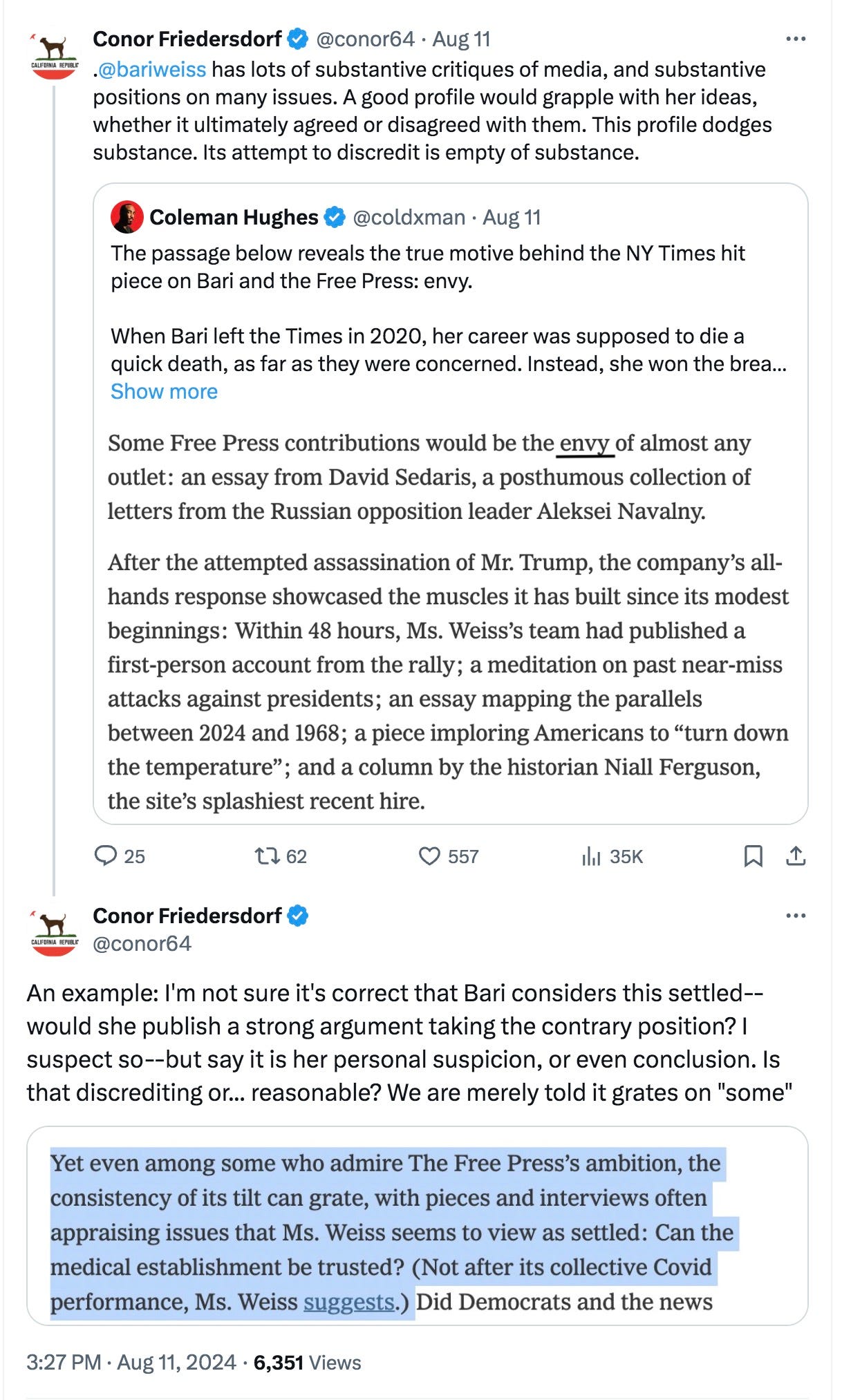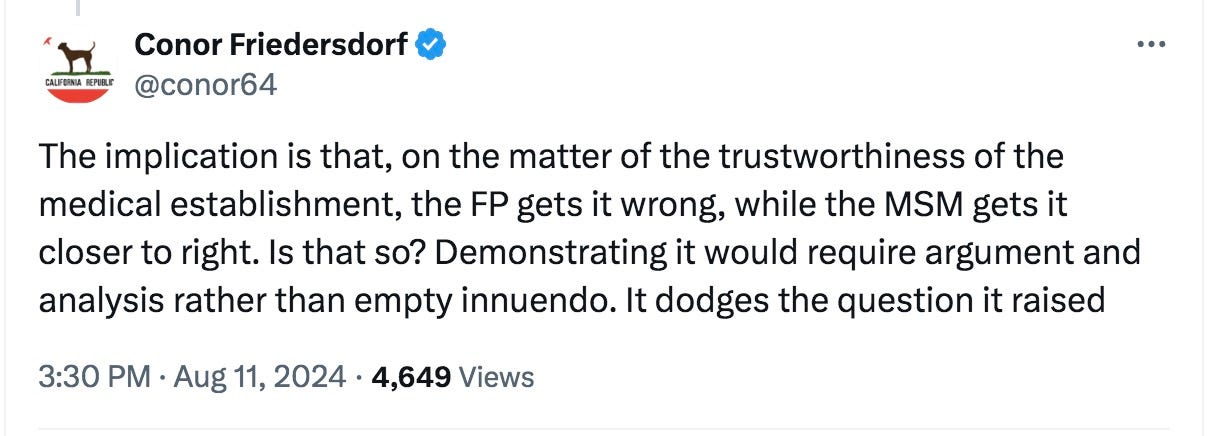E-Pluribus | August 13, 2024
Liberalism's foibles; so ... about the children; and America—what's the big idea?
A round-up of the latest and best musings on the rise of illiberalism in the public discourse:
Pratap Bhanu Mehta and Francis Fukuyama: Is Liberalism Prone to Self-Undermining Excesses?
At the end of last month, our daily roundup featured part of a conversation between Francis Fukuyama and Pratap Bhanu Mehta at a conference of the Institute for the Study of Modern Authoritarianism (ISMA.) Today we have some excerpts from the second part of that conversation, hosted by The UnPopulist.
[Pratap Bhanu Mehta:] [T]he question for you is this: In a sense, liberalism has always depended on a certain kind of optimism about growth. The future will be better than the past. There’s a sense of futurity to it. Are we in a deeper crisis where that confidence is actually waning across the world? Layer on top of that the climate crisis and the crisis of the Anthropocene. What would a liberalism look like that cannot as confidently take for granted that sense of trajectory of economic growth that more or less we’ve been accustomed to since World War II, or certainly since 1991?
Fukuyama: I always run into this argument, especially talking about issues like climate. So somebody says, “Well, what’s liberalism going to do about climate?” Well, what’s any system going to do about climate? I don’t think that if there is a general slowdown in productivity growth, it is going to be unique to liberal societies. And in fact, I would think that liberal societies, because they are liberal, are more likely to come up with the kinds of innovations that would be necessary to sustain growing productivity. The historical record of the last, say, 150 years kind of indicates that liberal societies are able to adjust.
I really think this economic problem is, in a way, the lesser of the big problems that we face. We’ve had this pendulum swing between more state intervention in the interest of more equality and social stability, and then times when the pendulum swung back—so, very liberal in the late 19th century, and then you get the big crisis in 1907 that leads to the formation of the Federal Reserve, and then the Great Depression, which creates all these new institutions. I just think that we’re in the midst of a pendulum swing. We never get the pendulum to just rest in the middle. It always goes a little bit too far, but this has been going on for a long time, and I don’t see any reason why you’re not going to continue to make these adjustments. Just think about what the Biden administration has done to neoliberalism: It’s destroyed it. Industrial policy, protectionism, they’re all back in a big way.
In a way, it’s easier to fix those kinds of worries about economic growth than it is on the other side to fix this expansion of people’s understanding of what the realm of individual autonomy ought to be. It’s much easier, in other words, to say, “Yeah, we should regulate tech. We should do antitrust. We should not go for free trade deals with quite as much enthusiasm.” That’s relatively easier to do politically. What’s harder to do is readjust people’s sense of their individual rights and say, “Well, maybe we need to scale those back.”
Mehta: But doesn’t the current kind of critique of neoliberalism and the turn that the Biden administration has taken [in terms of industrial policy and protectionism] while eminently understandable and defensible in some respects, also not risk creating a world of more zero-sum conflicts? Because the nice thing about that neoliberal illusion, 1991 to 2009, was that you could think of a global geopolitical order where there were, at least on economics, fewer zero-sum conflicts. One of the ways in which the Biden program is sold domestically—and the rest of the world worries about this—is as a project of American primacy. And at the beginning of the 21st century, any project that describes itself as a project to reestablish primacy, however motivating and energizing it might be, runs exactly that risk of liberal parochialism that got us conflicts in the 19th and 20th centuries. How do we reconcile this tension?
Fukuyama: I’m not so sure that the primacy argument was that critical. It seems to me that the general proposition that you can’t sustain liberal democracy without economic growth is pretty clear. A market economy produces inequality. You can mitigate it through social policy and social protections and so forth, but you’re going to have this fundamental inequality that will probably grow over time. The only way that you can make democratic publics not revolt against that system as a whole is by having what they call “shared growth.” It may not be equal growth, but people’s living standards are increasing.
[. . .]
. . .If that stops, then we’re back in a zero-sum world, where the only way you can get rich is by taking something from somebody else. That’s going to be a disaster. You can’t have a liberal democracy under those conditions. But look at what’s going on now with the new technologies that are coming online. I’m not really convinced that we’re back in this Malthusian situation where you can get rich only at somebody else’s expense.
Read it all here.
Elayne Allen: ‘What Are Children For?’ Can’t Remain a Question Forever
Much ink has been spilled in recent years agonizing over whether or not it’s moral to bring children into the world anymore. At The Dispatch, Elayne Allen reviews a new book—What Are Children For?—and says it’s a good guide for those still struggling with the issue. The book also explores the bigger picture: the value of life itself, from which the question about children springs.
Decisions about family and fertility cannot be divorced from public debate, and not just because childless women spook some people or because most developed nations face below-replacement birth rates. Rather, our social atmosphere sets the tone for how we think and talk about having kids (or not). The current cultural climate tends to throw the full burden of this choice onto individuals, usually women, and it declines to present family as a straightforward good. As a result, children come to be seen as just one possible adventure among others.
Such suffocating public neutrality is at least part of what a minor flurry of books over the past year have attempted to correct. Amid plummeting marriage and birth rates, these books point to the social and economic value of family along with its enduring promises of fulfillment. But it is Anastasia Berg and Rachel Wiseman’s new book, What Are Children For? On Ambivalence and Choice, that most directly confronts debates over whether having kids is defensible at all. It’s a provocative, persuasive book that rightly perceives that behind discussions about how economics, family policy, or climate change impact people’s reproductive choices lies a deep uncertainty about the goodness of human life itself.
What Are Children For? is bookended by personal essays from its authors, who are also editors of the magazine The Point. Wiseman reflects on her crippling doubts over whether to have children to open the work, and Berg offers a meditation on motherhood to conclude it. The four intervening chapters address different sources of modern ambivalence and reluctance to have children. The authors tackle a wide variety of issues that tend to complicate reproductive decisions: the strange idea that romantic love becomes contaminated if one partner wants children too soon; or the fact that modern men, in an act of misplaced deference to female autonomy, often leave the decision almost entirely to women. They explore the significance of reproduction being, for the first time, a fully deliberate choice, and the related idea that having kids is one possible life path among many other equally valid ones. With its newfound optionality, the towering possibility of creating life confronts people with a decision more totalizing than most 20-or-30-somethings are accustomed to making at that age.
Berg and Wiseman address their book to politically progressive readers who are on the fence about this choice. Along the way, they dissect and debunk common refrains in debates over reproduction in academic and popular thought. For example, many young people—including some they interviewed or surveyed in the book—frequently cite finances and a high cost of living as reasons to avoid having children. Yet the authors show that a purely economic explanation of plummeting birth rates is far from complete. As they explain, “Even in countries with robust pro-family policies … millennials are often no more likely to start families than their American counterparts.”
They also examine feminism’s indecisive appraisal of maternity. Some feminists, like the Canadian writer Shulamith Firestone, see it as the crux of female oppression; others, such as philosopher Sara Ruddick, treat motherhood as a key source of human goodness, one that ought to be evangelized. Berg and Wiseman show how the feminist tradition has its own ambivalence about motherhood which, while fascinating and stimulating, will likely leave its students with all the uncertainty they began with.
[. . .]
What Are Children For? provides a real service in helping readers navigate the stakes of today’s reproductive debates. But for all the intellectual and moral depth they perceive in the act of having children, they oddly stop short of acknowledging its full significance—even as the force of their writing gestures toward it.
Read it all.
Robert Tracinski: America Is Absolutely an Idea
Is America an idea or a place? Since apparently no one is happy with the answer “both,” Robert Tracinski at Discourse Magazine spends some time examining the concept of America as an idea and explaining why it’s not contradictory to “America” in the geographic sense.
In his speech explaining his decision not to run for re-election, President Biden answered this question one way: “America is an idea… the most powerful idea in the history of the world. … We are all created equal, endowed by our creator with certain inalienable rights: life, liberty, the pursuit of happiness.” The week before, in his acceptance speech at the Republican convention, vice presidential nominee J.D. Vance seemed to go in the other direction, declaring, “America is not just an idea. It is a group of people with a shared history,” “a homeland.” He added: “People will not fight for abstractions.”
Vance was straddling the fence a bit, as politicians tend to do, allowing for some role for ideas in America’s identity. But he was widely understood to be making a nod toward the nationalist conservative position that America is not defined by ideas but is instead a set of people, a geographic place, and most of all “specific practices, traditions and customs”—the “experience of intergenerational communities.”
[. . .]
The nationalist conservatives begin by overturning the history and tradition of the conservative movement itself. It was Margaret Thatcher who told conservatives at a 1991 meeting at the Hoover Institution that America was “built upon an idea—the idea of liberty,” in remarks that were widely paraphrased as: “Europe was created by history. America was created by philosophy.”
In an early speech, Ronald Reagan declared, “America is less of a place than an idea,” and in his famous farewell address in 1989, he was even more emphatic: “America is freedom—freedom of speech, freedom of religion, freedom of enterprise.”
Reagan and Thatcher were right. After all, if America was defined by customs and culture, we might not have struck out on our own as an independent country. Our original cultural identity was British, and in the years leading up to the American Revolution, the founders routinely referred to the colonies as “British America.” Our ties to Britain and its culture, history and even its monarchy were strong, and we wouldn’t have staged a revolution and begun moving away from that cultural identity if not for those pesky ideas.
[. . .]
In an 1818 letter, Adams argued that “the real American Revolution” was a “radical change in the principles, opinions, sentiments, and affection of the people,” and he specifically contrasted this to our traditions and customs.
The colonies had grown up under constitutions of government so different, there was so great a variety of religions, they were composed of so many different nations, their customs, manners, and habits had so little resemblance, and their intercourse had been so rare and their knowledge of each other so imperfect, that to unite them in the same principles in theory and the same system of action was certainly a very difficult enterprise.
Thus, he recommends the project of “searching and collecting all the records, pamphlets, newspapers, and even handbills, which in any way contributed to change the temper and views of the people and compose them into an independent nation.” He describes America’s national identity as being forged through a shared ideology.
[. . .]
The fact that America was founded on ideas rather than specific traditions or customs also explains the cultural dynamism that is characteristic of America and essential to its greatness. All the way back in 1835, Alexis de Tocqueville described “the American philosophical method,” our habitual way of approaching the world.
To escape from imposed systems, the yoke of habit, family maxims, class prejudices, and to a certain extent national prejudices as well; to treat tradition as valuable for information only and to accept existing facts as no more than a useful sketch to show how things could be done differently and better; to seek by themselves and in themselves for the only reason of things.
Read the whole thing.
Around Twitter (X)
Author Abigail Shrier, pilloried for her book on girls and transgenderism, has written an open letter to Dr. Hillary Cass, who has received similar treatment for the Cass Review, a report commissioned by Britain’s National Health Service on gender-affirming care for children:
Conor Friedersdorf critiques the New York Times’ recent article on its erstwhile op-ed writer Bari Weiss:
And finally, a flashback from Colin Wright on pre-Musk Twitter:










